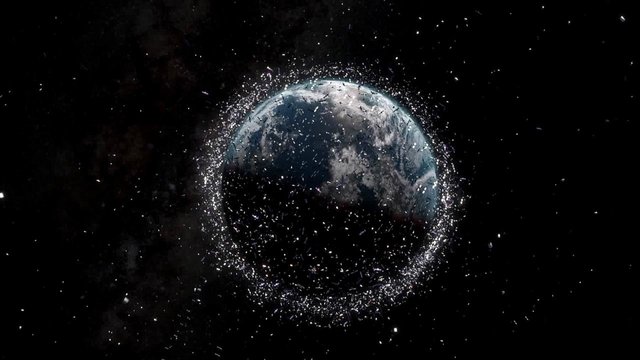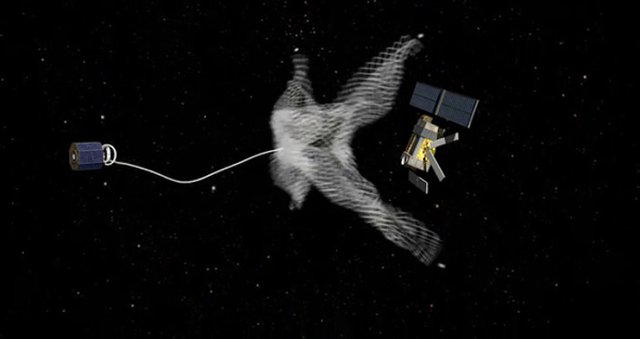RemoveDEBRIS - Test Mission Is Running To Clean Up The Junk in Space
Over the years, man has sent thousands of satellites into Earth's orbit. However, many of these devices have given up over time and have been discarded. However, this gradually became a problem. Meanwhile several thousand non-functional satellites circle in the orbit of the earth. The problem with it is that they are dangerous, because they sometimes crash together with other still functioning satellites and thus damage these.
The estimates of artificial objects in orbit go up to 600,000 pieces. These objects have a minimum diameter of 1cm and the total weight of all objects is estimated up to 700.000 tons. That's just the rubble and every day there will be more. At Stuff in Space you can follow in real time all artificial objects in earth orbit and their exact positions. Of course all top secret military satellites are excluded. The site is operated by NASA's Orbital Debris Program.
These objects are mostly decommissioned satellites, satellites that have failed, had a malfunction and are no longer functioning. But not only satellites belong to the space junk - also used rocket stages, screws. bolts, solar modules, cables, circuit boards and much more. Everything that makes a satellite flies around up there. Some are smaller parts, but the danger of smaller parts is just as big as with the big ones, because they can develop very quickly into shots that can damage other satellites or even space vehicles without problems.
The International Space Station ISS has already experienced the dangerous nature of space debris several times. The station often had to fly evasive maneuver to avoid colliding with the scrap in orbit. In march 2012 the whole thing was so threatening for the space station that it had no time for an evasive maneuver and the crew had to look for protection in a docked space capsule at the last moment and could only pray that everything would go well.
In recent years there have been considerations on how this space debris could be removed in order to clean up the space up there, to alleviate the danger and to create space for new generations of satellites.
The considerations were based on harpoons that capture one or more satellites and cause them to fall into the earth's atmosphere so that they can burn up there. Another idea was to capture smaller objects with trap nets and send them also into the Earth's atmosphere to burn up there.With Airbus (I had written about it here) other european participants and in cooperation with ESA and Space-X, the RemoveDEBRIS Mission startet under the direction of the University of Surrey and the mission was finally launched on 4 April 2018, brought to the ISS with the SpaceX mission CRS-14 and launched into orbit on 20 June 2018.
In September 2018, the mission tested catching system with a net. A subsatellite called DebrisSat-1 (DS-1) was launched and after a while successfully captured with the net.
The second test took place in october 2018, when another sub-satellite called DebrisSub-2 (DS-2) was launched and a 2D camera and 3D LIDAR technology ( i had written about the LIDAR technology here) were used to determine position and speed. This was used to test the visual identification of space debris.
In February 2019, the third test was finally carried out, in which a harpoon was fired at an obsolete solar module and captured. Despite the complexity of the experiment, according to reports from several news agencies it was a success.
In March, this month still, the last test will take place. The responsible persons want to introduce the controlled entry of the RemoveDEBRIS satellite into the earth's atmosphere with the help of a sail. If you would leave the satellite as it is, it would take another 2.5 years until it burns up by itself in the earth orbit. With controlled depreciation, it would take 8 weeks.
It will be hard to get rid of the junk in orbit and certainly we won't be able to get rid of everything, but the first step is now already done.





Hi, @oendertuerk. It's a scary subject, but with so much space movement, I do not think it's impossible to remove the space junk.
Deine Posts sind hammer. Very informative, valuable and the effort is well appreciated. Thank you!
Posted using Partiko iOS
ty @yangyanje
I like the idea of the nets very much, but I am confused by the harpoon approach.
I understand how the harpoon allows to snag a satellite, and than pull it out of orbit, but I can hardly believe that the harpoon impact in itself does not create additional debris. And given that even the slightest speck of dust at orbital speeds is amazingly destructive in a collision, 1 intact satellite might be less dangerous than 5 small parts of metal produced by an attempt to remove the intact satelite
you are right, but i dont know how they will handle it.
One thing I don't get, why did they have to launch a subsatellite to test the net even though they had a map of where most of the debris is located.
How the future will look like? I think the headlines will look like this;
"Elon Musk finds a way to collect all spacejunk."
The launch of Space X's Operation Junk Wars (Collect Junk and Recycle on the spot, transport it back
to earth).
I'm telling ya, that car he shot up there is remapping the location of debris...
It's an interesting idea. You can track it here
@faustofraser the subsatellits were only for tests. i dont know if and how they will handle future missions.
This seems like a really great initiative. It is scary the amount of crap that is flying around out there! When you say sail, are you talking a solar sail? That is pretty awesome if that is the case. I think that is a technology we definitely need to explore more and if they can implement it here to do the good work of this debris cleaner, even better!
you are right i love you dear
muy buen pots me gusto mucho
Hi, @oendertuerk!
You just got a 2.08% upvote from SteemPlus!
To get higher upvotes, earn more SteemPlus Points (SPP). On your Steemit wallet, check your SPP balance and click on "How to earn SPP?" to find out all the ways to earn.
If you're not using SteemPlus yet, please check our last posts in here to see the many ways in which SteemPlus can improve your Steem experience on Steemit and Busy.
Very interesting, I like science.
Hi @oendertuerk!
Your post was upvoted by @steem-ua, new Steem dApp, using UserAuthority for algorithmic post curation!
Your UA account score is currently 4.727 which ranks you at #1521 across all Steem accounts.
Your rank has improved 7 places in the last three days (old rank 1528).
In our last Algorithmic Curation Round, consisting of 219 contributions, your post is ranked at #16.
Evaluation of your UA score:
Feel free to join our @steem-ua Discord server